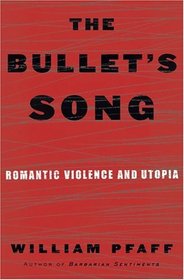Search -
The Bullet's Song : Romantic Violence and Utopia
The Bullet's Song Romantic Violence and Utopia
Author:
A hidden moral history of the twentieth century unfolds in William Pfaff's fascinating story of writers, artists, intellectual soldiers, and religious revolutionaries implicated in the century's physical and moral violence. They were motivated by romanticism, nationalism, utopianism -- and the search for transcendence. To our twenty-first cen... more » The account begins with Italy's Futurists, who glorified war as "the world's only hygiene"; painted speed, action, and noise; invented "found sound" and chromatic pianos; thought violence sublime; and demanded "reconstruction of the universe." Gabriele D'Annunzio, poet, playwright, and nationalist buccaneer, created a revolutionary utopia in a Dalmatian city stolen in 1919 from Woodrow Wilson and the Versailles Treaty makers. In doing so, he invented the political style and rituals of Fascism, as well as Third World liberation. T.E. Lawrence, archaeologist and spy, guided the Arab revolt against the Turks, becoming both "Uncrowned King of Arabia" and masochist secular saint. Ernst Jünger, artist and scientist, the German army's most decorated hero of World War I, made heroism a political ideology and became intellectual leader of the National Cause. Hitler was a follower. In World War II Jünger plotted Hitler's assassination and survived to become a symbol of Franco-German reconciliation. Willi Münzenberg, Lenin's propaganda genius and an original member of the Comintern, invented the political "front" organization, created the Sacco and Vanzetti case, and seduced a generation of "innocents" to the Communist cause before becoming a dissident himself. He wasstrangled by Soviet agents in a French forest. André Malraux, fantasist "Byron of the 1930s," world-famous novelist, emulator of T.E. Lawrence, and make-believe leader of the Chinese revolution, discovered "that daydreaming gives rise to action." He created and led an air squadron for Republican Spain, wrote himself into the script of the French Resistance as a hero -- and became one. Arthur Koestler, the most famous scientific journalist in Europe, was a Comintern spy in Spain; condemned to death there, he abandoned the cause and wrote Darkness at Noon, the most influential anti-Communist work of its time, before committing suicide in 1976. Others with roles in The Bullet's Song are Benito Mussolini, Filippo Tommaso Marinetti, Che Guevara, Charles de Foucauld, Simone Weil, Jean-Paul Sartre, Simone de Beauvoir, Europe's terrorists of the 1970s, and "Popski" -- Vladimir Peniakoff -- the honorable man who found happiness in leading his private army to war.
Author:
A hidden moral history of the twentieth century unfolds in William Pfaff's fascinating story of writers, artists, intellectual soldiers, and religious revolutionaries implicated in the century's physical and moral violence. They were motivated by romanticism, nationalism, utopianism -- and the search for transcendence. To our twenty-first cen... more » The account begins with Italy's Futurists, who glorified war as "the world's only hygiene"; painted speed, action, and noise; invented "found sound" and chromatic pianos; thought violence sublime; and demanded "reconstruction of the universe." Gabriele D'Annunzio, poet, playwright, and nationalist buccaneer, created a revolutionary utopia in a Dalmatian city stolen in 1919 from Woodrow Wilson and the Versailles Treaty makers. In doing so, he invented the political style and rituals of Fascism, as well as Third World liberation. T.E. Lawrence, archaeologist and spy, guided the Arab revolt against the Turks, becoming both "Uncrowned King of Arabia" and masochist secular saint. Ernst Jünger, artist and scientist, the German army's most decorated hero of World War I, made heroism a political ideology and became intellectual leader of the National Cause. Hitler was a follower. In World War II Jünger plotted Hitler's assassination and survived to become a symbol of Franco-German reconciliation. Willi Münzenberg, Lenin's propaganda genius and an original member of the Comintern, invented the political "front" organization, created the Sacco and Vanzetti case, and seduced a generation of "innocents" to the Communist cause before becoming a dissident himself. He wasstrangled by Soviet agents in a French forest. André Malraux, fantasist "Byron of the 1930s," world-famous novelist, emulator of T.E. Lawrence, and make-believe leader of the Chinese revolution, discovered "that daydreaming gives rise to action." He created and led an air squadron for Republican Spain, wrote himself into the script of the French Resistance as a hero -- and became one. Arthur Koestler, the most famous scientific journalist in Europe, was a Comintern spy in Spain; condemned to death there, he abandoned the cause and wrote Darkness at Noon, the most influential anti-Communist work of its time, before committing suicide in 1976. Others with roles in The Bullet's Song are Benito Mussolini, Filippo Tommaso Marinetti, Che Guevara, Charles de Foucauld, Simone Weil, Jean-Paul Sartre, Simone de Beauvoir, Europe's terrorists of the 1970s, and "Popski" -- Vladimir Peniakoff -- the honorable man who found happiness in leading his private army to war.
The Market's bargain prices are even better for Paperbackswap club members!
Retail Price: Buy New (Hardcover): $34.00 (save 40%) or
Become a PBS member and pay $30.10+1 PBS book credit
![header=[] body=[Get a free book credit right now by joining the club and listing 5 books you have and are willing to share with other members!] Help icon](/images/question.gif?v=90afaeb39) (save 47%)
(save 47%)ISBN-13: 9780684809076
ISBN-10: 0684809079
Publication Date: 10/26/2004
Pages: 384
Rating: ?
ISBN-10: 0684809079
Publication Date: 10/26/2004
Pages: 384
Rating: ?
0 stars, based on 0 rating
Genres:
- History >> World >> 20th Century
- Politics & Social Sciences >> Politics & Government >> Ideologies & Doctrines >> Radicalism




